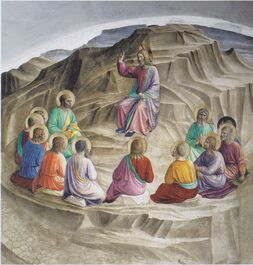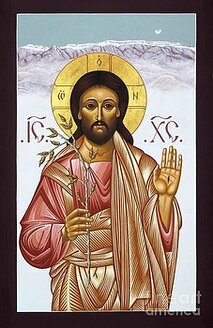 blessed means 'holy' or 'happy' blessed means 'holy' or 'happy' If we were to read only one part of the gospel message of Jesus, it ought to be the Sermon on the Mount. I say this because of how it impressed me the first time I attempted to read the Bible as a teenager. Unfortunately, the only Bible at hand was my mother’s old Douay-Rheims version which was rife with antiquated language. I did follow the narrative, but it was tough going, given the translation. But when I got to Matthew’s Gospel, I was so taken by the Sermon on the Mount (Matthew 5-7) that I hand copied it into a little notebook so that I could read it again and again. I was smitten by the first verses, the Beatitudes. I did not really understand why being meek or mourning would make one blessed, nor did I know that blessed means ‘holy’ or ‘happy,’ but what I did know deep in my heart was that this was the key to being like Jesus since this is what He told us to do. Happily, a few years later I was gifted with a New American Bible which helped tremendously and added to my fascination with those chapters in Matthew. The Beatitudes and the rest of the Sermon became like a gospel within the Gospels. It seemed to me that if we got this right, we would be living as Jesus desires. And within this microcosm of the gospel, just as He taught us to act, He taught us to pray: if we were to only pray one prayer all our lives, it should be the Lord’s Prayer. Together, these two could be enough to meditate upon and to live from. They contain a key to understanding the heart of Jesus and the path to holiness.*  we desire to grow in holiness we desire to grow in holiness Found in Matthew 5:3-12, the Beatitudes are virtuous characteristics which elicit subsequent ‘actions’ that we need to continually work at developing. Each one is an attribute of holiness, and collectively they are characteristics not of the weak, but of the strong. Briefly, to be poor in spirit means that we are humble before God and in recognizing our need for Him, we desire to grow in holiness and actively seek Him; to be meek is to be humble such that we know who we are before God and therefore serve Him by serving others; to mourn is about lamenting evil, injustice, suffering, and the effects of sin, (ours and that of the world), and then to work against these evils; to hunger and thirst for righteousness is about desiring justice, thus becoming more just in our actions; to be merciful is about seeking and receiving God’s mercy such that our own hearts are moved to mercy toward others; to be clean of heart is to desire purity in word and deed, cultivating a heart that only seeks to do the will of God; to be a peacemaker is to recognize how much we have been forgiven and consequently forgive others, to let go of anything we desire to possess in order to grow in interior freedom, bringing a calming presence to those we are with. Finally, to rejoice when we are insulted is not to seek injury, but to realize the depth of our love and to live it such that if the occasion arises we are willing to suffer for the sake of the Kingdom. If these sound impossible, that is because to have them all would mean we are perfect, and of course, we are not. But we can grow in each of them so as to be happier and holier, which ultimately means, to be truly free.  our daily bread our daily bread To live as a ‘child of the Beatitudes’ we do not need any extraordinary gifts, talents, or to be in spectacular situations. All we need to attain them is found within the Sermon on the Mount, the gospel within the Gospels, especially when Jesus taught His disciples (us) how to pray. (Matthew 6:9-14) He wanted us to recognize God as the Holiest of Holies who, rather than being inaccessible, is our Father, our Abba (Daddy), whom He says to freely and lovingly address with intimacy. We are to offer ourselves to Him such that we desire His will to be done not only by ourselves, but to be done in the world, ultimately desiring His Kingdom to be fulfilled. We beg humbly for what we need to do His will, our daily bread: the Eucharist and all the graces needed this day, especially the grace to forgive as He does because we, too, need forgiveness,** and that we would not be tested beyond our strength by the evil one, but rather that He would strengthen and preserve us from the enemy’s power and sway. Thus, this prayer contains everything necessary to growing in intimacy with God.  reflect on the gospel within the Gospels reflect on the gospel within the Gospels In short, the Sermon on the Mount, especially the Beatitudes and the Lord’s Prayer, contains the heart of what it means to be Christian, a disciple of Jesus Christ who desires to be merciful as He is merciful, loving as He is loving, and humble as He is humble. To be this way is to have the strength that comes from faith and trust in Jesus. While all of the Gospels are beautiful and incredibly important, I believe that if we were to read only one, and within that, only one part of the Gospel, it should be the Sermon on the Mount. Pray with it, reflect upon it, and chew on it continuously: it is the heart and soul of Jesus’ teaching, thereby revealing Who God is.  may we know Jesus better may we know Jesus better May we give thanks to have been given the Sermon on the Mount, the gospel within the Gospels! May we learn more each day about how to live the Beatitudes and put them into action! And may we seek to grow in prayer so that we may know Jesus better and grow ever closer to God! Let us meet in the Heart of Jesus! Peace! ©Michele L. Catanese † In loving memory of David Coupar, a dear friend and probably the most devoted reader and ‘sharer’ of this blog over the years. He never failed to make a kind, encouraging comment. May he rest in peace! *To be clear, the Sermon on the Mount also appears in Luke’s Gospel, but he sets it on a plain, rather than a mountain so as not to cast fear into his Greek audience who feared the thought of gods on mountains. Luke’s version is wonderful also, but for the sake of this entry, I only mention Matthew’s account. **Elsewhere in the Sermon, Jesus said to take the plank out of our own eye before attempting to take a splinter out of someone else’s eye, so clearly He is teaching that forgiveness entails becoming humble enough to recognize the greatness of the mercy we have received and then to extend it to others who may have wronged us. (Matthew 7:3-4) Final note: I would add to this a suggestion that we also meditate on the Fruits of the Spirit which St. Paul lists in his letter to the Galatians (5:22-23): love, joy, peace, patience, kindness, generosity, faithfulness, gentleness, and self-control. These are all virtuous actions we want to be present within us so that they, too, ‘grow us’ into holiness. If we become alive in the Spirit, that is, if we become intimate with the Holy Spirit through our prayer and desire to live out the Beatitudes, we will be bearers of the Holy Spirit made apparent through those fruits. Images: 1. My photo, Bible. 2. Fresco Painting, Sermon on the Mount, by Blessed Fra Angelico. 3. Painting, Still Life with Bottle, Carafe, Bread and Wine, by Claude Monet (1862-63) For more on this painting, www.nga.gov/collection/art-object-page.164942.html 4. My photo, Luminous Trees, taken outside of Schulenburg, Texas 5. Icon, Nuestro Salvador de las Sandias, by Fr. William Hart McNichols. To purchase a copy in one of many mediums, go to fineartamerica.com/featured/nuestro-salvador-de-las-sandias-012-william-hart-mcnichols.html Note: In compliance with GDPR rules, I wish to make it clear that I do not gather any information on any of my readers at any time.
Evelyn Cambria
6/26/2023 08:43:17 am
Thank you, Michele, for your beautiful and enlighten writings. I really enjoy reading them and I appreciate especially this one how they supplement my daily scripture readings. Blessings and God's peace to you.
Deacon Domingo
6/26/2023 09:04:18 am
Thank you for directing me to your blog. It so happened that I was doing the parish’s Passion for Divine Mercy when your message popped up on my phone and your words just echoed St Therese’s words: “if love were to die away…”, “if we got this right…”, “if we were to pray…”
Tony C
6/26/2023 05:19:50 pm
Thank you for a beautiful, thought provoking reflection. Comments are closed.
|
Heart Speaks to Heart
|

 RSS Feed
RSS Feed

